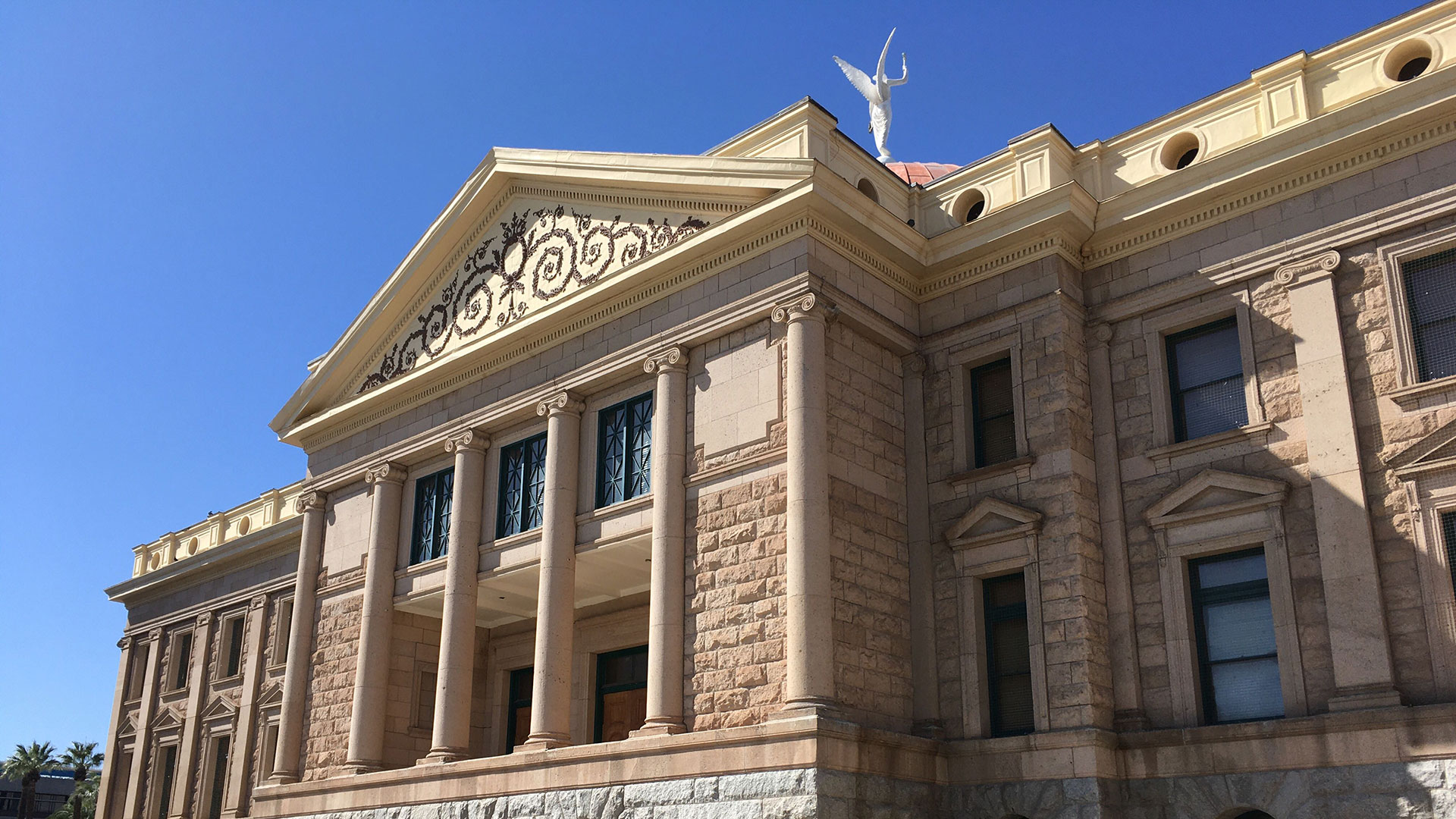 The Arizona state Capitol on March 3, 2020.
The Arizona state Capitol on March 3, 2020.
Este articulo esta disponible en español.
The controversial House Concurrent Resolution 2060, also known as the “Secure the Border Act,” passed Arizona’s House of Representatives Tuesday afternoon. The measure will now be decided by voters in the November election.
If approved, the ballot measure will make it illegal for undocumented immigrants to enter the state from anywhere besides a port of entry. The proposition mirrors a similar action taken by Texas that has since been put on hold by a federal appeals court until its challenges are resolved.
The proposal would bypass Democratic Governor Katie Hobbs, who vetoed a similar measure earlier this year.
Opponents of HCR 2060 compared it to 2010’s SB 1070, which was considered to be the country’s strictest legislation meant to combat illegal immigration. The U.S. Supreme Court partially struck down the law but upheld the “show me your papers” provision that would verify immigration statuses during law enforcement stops.
Critics said this perpetuated racial profiling by police. Those same concerns were echoed on the House floor Tuesday afternoon regarding this year’s ballot proposition.
“My colleagues on the other side swear this new law won't lead to racial profiling. Unfortunately, we can't be assured of this,” Democratic Representative Patricia Contreras said. “Many brown-skinned people like myself were profiled when ‘the show me your papers’ SB 1070 was law… This measure gives police full immunity even if they arrest someone with probable cause.”
Many, like democratic Representative Judy Schwiebert, say the legislation is unconstitutional and will eventually increase policing costs.
“They are already understaffed and now this bill requires them to also do the job of federal law enforcement,” Schwiebert said. “How many robberies and other crimes in our local communities will now go uninvestigated? How many crimes will go unreported by immigrants and Latinos who will be too scared to trust law enforcement to protect them? HCR 2060 is an anti-public safety bill.”
Under the measure, state corrections would be required to keep those charged or convicted in custody if local or county-level law enforcement does not have room.
According to a fiscal note sent by the Joint Legislative Budget Committee, “the resolution would result in added workload for local public attorneys and public defenders related to the prosecution of HCR 2060 crimes” and “eventually lead to higher incarceration costs at the Arizona Department of Corrections and at the county level.” Additional costs may also include translation services and transportation for non-English-speaking individuals.
It was also noted that a 2023 report from the Federation for American Immigration Reform estimated that 610,000 individuals without a lawful presence cost the state $3.2 billion annually.
“In terms of the 610,000 population, FAIR estimates that Arizona spends $1.36 billion for their education, $631.3 million for their justice-related and incarceration and the remaining $1.2 billion for other programs such as healthcare and public assistance,” the fiscal note reads. “We are not aware of how FAIR derived the Arizona-specific estimates since the report only provides information on the nationwide methodology and not the state's portion.”
House Republicans disagree saying the proposal is meant to prioritize the safety of Arizonans from issues like drug smuggling. Some, like Republican Representative Matt Gress, said it was time for Arizona to take control of the border, citing failures from the federal government to secure it.
“We are a nation of immigrants, but we are also a nation of laws,” Gress said. “Today, this house can renew our commitment to the rule of law and to orderly immigration.”
Republican Speaker Ben Toma says the bill will strengthen E-Verify–a web-based program meant to verify employment eligibility, enhance sentencing for fentanyl dealing, and make it a state crime to enter Arizona from a foreign nation somewhere other than a port of entry.
“I'm an immigrant. This is not anti-immigrant,” Toma said. “This is anti-lawlessness. It's about securing our border because the federal government has failed to do their job. The people of Arizona will get the final say in this issue.”
Closed Gallery
The gallery, where the public may observe House and Senate proceedings, was closed after House Republicans cited “security concerns prompted by the shameful and illegally disruptive conduct by Democrats and their leftist allies.” Speaker Ben Toma said he decided to close the gallery after Democratic Representative Analise Ortiz called for it to be kept open.
“The public gallery should be open to the public,” she said. “This is the people’s House.”
The move comes after the immigration rights organization Living United for Change in Arizona, better known as LUCHA, packed the gallery when the Senate upheld the ballot proposition a few weeks ago. A dispute ensued between Senate President Warren Petersen and LUCHA activists.
“MAGA Republicans like to treat the Arizona Legislature like their personal sandbox for the creation of racist legislation like HCR 2060,” LUCHA Executive Director Alejandra Gomez said. “Republicans don’t believe in democracy when the people get to witness their inhumanity in action. They want to legislate without looking into the eyes of Arizonans. Make no mistake in November they will see us.”

By submitting your comments, you hereby give AZPM the right to post your comments and potentially use them in any other form of media operated by this institution.